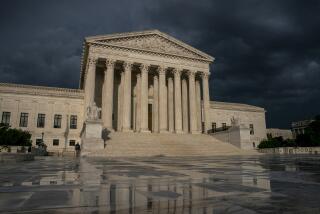The supreme law of the land
Re “Who should judge the judges?,” Opinion, April 8
In his argument for state sovereignty, David B. Rivkin Jr. forgets the supremacy clause of the U.S. Constitution. All states and the federal government are subject to the Constitution as the supreme law of the land. That is why the federal Supreme Court is right to hear and decide Caperton vs. Massey Energy.
Rivkin’s characterization is wrong: We do not presume a judge is impartial when, as in this case, there is a preponderance of evidence to the contrary. More to the point, rights guaranteed under and by the Constitution are clearly at issue here. That certainly makes this case worthy of Supreme Court review.
Or, if it is not the business of the Supreme Court to interpret and apply the Constitution, we are already lost and beyond all hope of recovery.
Micheal McLoughlin
San Francisco
--
I agree with Rivkin that most elected judges are people of integrity, dedicated to the rule of law. But there are exceptions. When a judge hears a case, despite the appearance of impropriety because millions in campaign contributions were received from one of the litigants, it reeks of bias.
When that judge is on the highest court in the state, what is the losing litigant’s recourse if appeal to a federal court is not available? Rivkin suggests the loser should be comforted with the hope that the judge won’t be reelected.
He argues that state court judges shouldn’t be subject to federal oversight. Did he develop this theory eight years ago when a decision of the Florida Supreme Court was reviewed by the U.S. Supreme Court in Bush vs. Gore? And will he stick with it if the Minnesota Supreme Court affirms Al Franken’s election?
Doris Schaffer
Fallbrook
More to Read
Sign up for Essential California
The most important California stories and recommendations in your inbox every morning.
You may occasionally receive promotional content from the Los Angeles Times.









